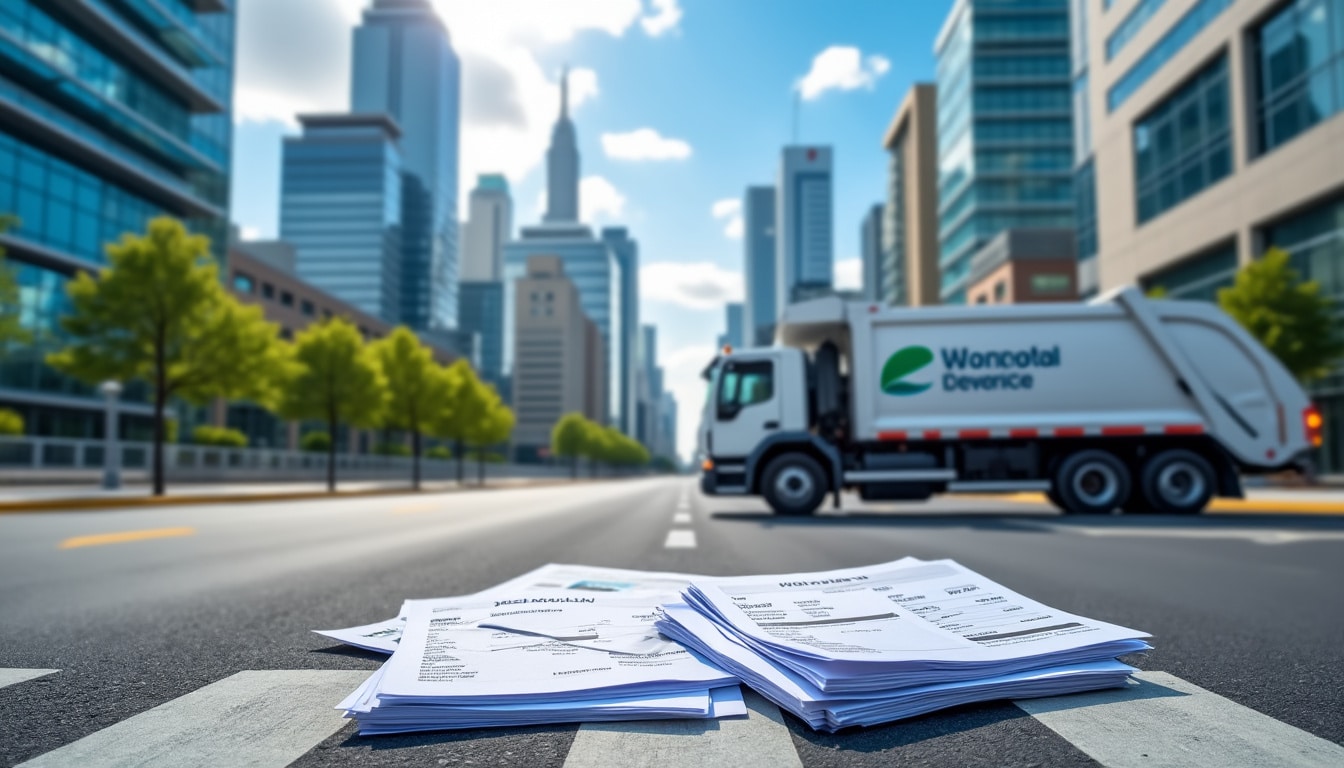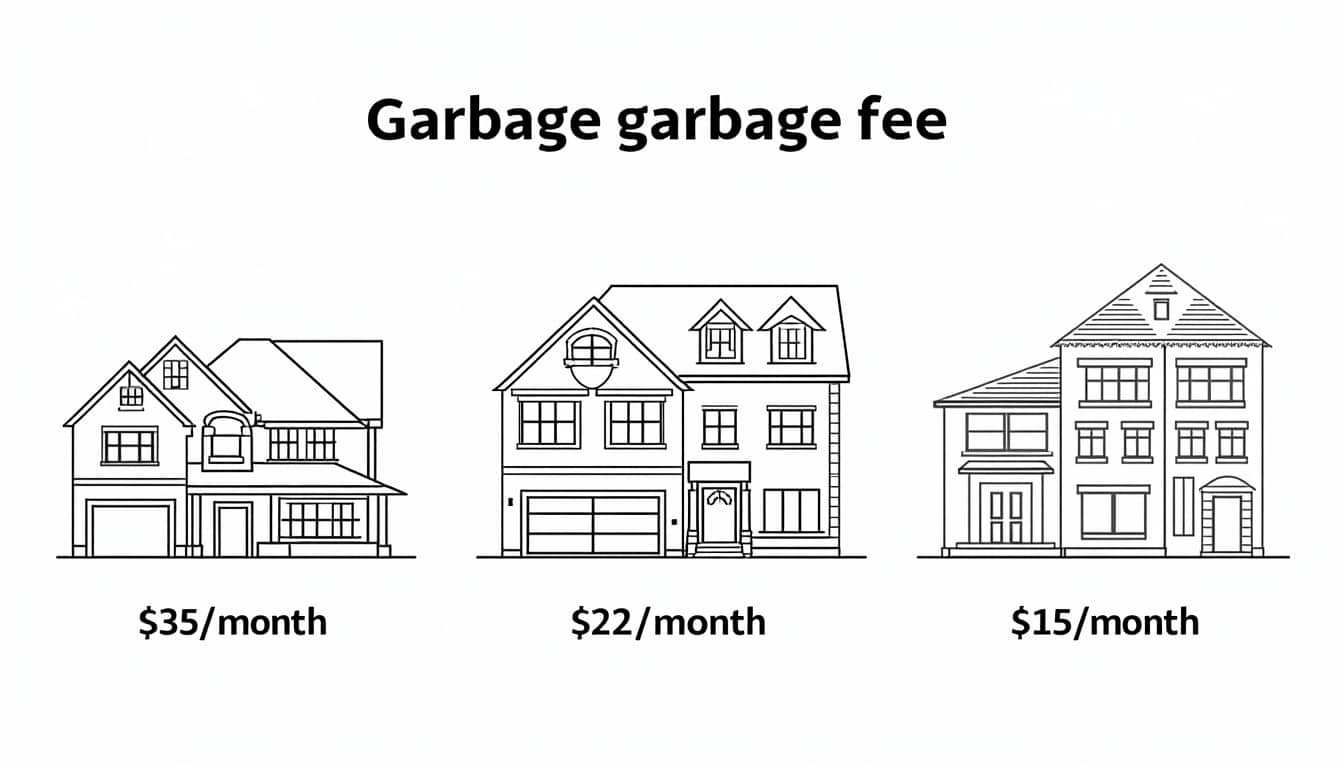Understanding trashbilling is crucial for managing your household expenses in 2025.With utility bills on the rise, every component counts.Trashbilling integrates waste management into your monthly payments.This change impacts how you budget for utilities.Cities like Chicago are leading the way in unified utility billing.Learn how trash fees contribute to overall utility costs.Discover strategies to mitigate the impact on your wallet.
What is Trashbilling and Its Role in Utility Bills
In 2025, trashbilling has become a standard component of utility bills for many households. Trashbilling refers to the integration of garbage collection services into the unified utility bill that also includes electricity, gas, and water. This system simplifies the payment process by consolidating various utility charges into a single monthly bill. For example, residents in Chicago are now required to pay a $9.50 per unit per month garbage fee, which covers all garbage collection services at their residence. This fee is part of the city’s effort to offset the annual $200 million spent on garbage collection for approximately 625,000 households.

The introduction of trashbilling aims to provide a more transparent and manageable way for residents to keep track of their utility expenses. Instead of receiving separate bills from different providers, everything is streamlined into one comprehensive statement. This approach not only reduces the administrative burden on both the utility companies and the consumers but also ensures that all necessary services are accounted for in the monthly payments. For instance, Constellation, a major utility provider, offers service plans that include garbage fees, allowing customers to choose plans that best match their usage habits and potentially save money.
Benefits of Unified Utility Billing
Unified utility billing, which includes trashbilling, offers several advantages. Firstly, it simplifies the payment process by reducing the number of bills a household receives each month. This can help in better budgeting and financial planning as all utility expenses are consolidated into a single payment. Additionally, service providers like Constellation offer energy efficiency tips to help consumers lower their overall utility costs, including trash fees.
Moreover, by incorporating trash fees into the utility bill, cities can ensure a more consistent and reliable funding stream for essential services like waste management. This is particularly important as the population grows and the demand for efficient waste collection increases. Companies like Waste Management and Republic Services play a significant role in handling the increased volume of waste, ensuring that urban areas remain clean and sanitary.
The Financial Impact of Trashbilling on Utility Bills
Trashbilling significantly affects the overall utility expenses of households. In 2025, the average American household may face increased utility bills due to the inclusion of garbage collection services. According to The Pricer, the average American household pays around $6,888 per year for utility bills, which now include trash and recycling services. This integration can lead to a notable rise in monthly expenses, depending on the number of dwelling units in a household.

The impact of trashbilling extends beyond just the garbage fee. For example, cities like Chicago have structured their garbage fees based on the number of dwelling units, with discounts available for seniors. A single-family home pays $9.50 per month, while a two-unit building pays $19 per month. Seniors receive a 50% discount, reducing their fee to $4.75 per month. These adjustments aim to make trashbilling more equitable, ensuring that vulnerable populations are not unduly burdened by additional costs.
How Trashbilling Contributes to Rising Utility Costs
The inclusion of trashbilling in utility bills contributes to the overall increase in utility costs. Several factors drive this rise, including the increasing costs of waste management, the necessity of maintaining sanitary conditions, and the expansion of recycling and waste processing facilities. Companies like GFL Environmental, Casella Waste Systems, and Advanced Disposal are continuously investing in infrastructure to handle the growing volume of waste, which in turn affects the pricing of their services.
Additionally, the rising costs of landfill space and the implementation of environmentally friendly waste processing methods contribute to higher fees. For instance, Covanta and Veolia are investing in advanced technologies to convert waste into energy, which, while beneficial for the environment, increases the operational costs passed on to consumers. These companies are essential in managing waste sustainably, but their investments are reflected in the utility bills that households receive.
Understanding the Garbage Fee Structure
The garbage fee structure is a critical component of trashbilling, determining how much each household pays for waste management services. In cities like Chicago, the fee is calculated based on the number of dwelling units, ensuring that the costs are distributed fairly among residents. For example, a single-family home is charged $9.50 per month, while a two-unit building pays $19 per month. This tiered pricing model helps to accommodate different household sizes and their corresponding waste generation rates.

The fee covers all garbage collection services at the residence, including regular pickup, recycling services, and the collection of bulky items like lawn waste. Importantly, there are no additional charges for recycling, making it a cost-effective way for residents to manage their waste responsibly. This all-inclusive approach ensures that households are not surprised by unexpected fees and can better plan their monthly budgets.
Senior Discounts and Exemptions
To make trashbilling more accessible, many cities offer discounts and exemptions for seniors. In Chicago, seniors receive a 50% discount on their garbage fees, reducing their monthly charge to $4.75 per unit. This discount is part of a broader effort to unify utility discounts, ensuring that eligible seniors receive the necessary financial relief without additional paperwork or qualifications. The criteria for these discounts are aligned with existing senior sewer exemptions, simplifying the process and making it more efficient for those who qualify.
Eligibility for the senior discount is typically based on age and property ownership or tenancy. This policy not only provides financial assistance to elderly residents but also encourages community members to continue using recycling and waste management services responsibly. By offering discounts, cities acknowledge the fixed incomes of many seniors and aim to reduce the financial burden of rising utility costs.
Managing and Reducing Utility Costs with Trashbilling
Managing utility costs in the era of trashbilling requires a strategic approach to budgeting and consumption. By understanding the components of their utility bills, residents can identify areas where they can reduce expenses. For instance, bundling services with providers like Republic Services or exploring different service plans with Recology can lead to significant savings. Additionally, implementing energy-efficient practices at home can lower electricity and gas bills, indirectly reducing the overall utility costs.
One effective strategy is to improve home insulation, which helps maintain a comfortable temperature without over-reliance on heating and cooling systems. Regular maintenance of HVAC systems and replacing old appliances with energy-efficient models can also lead to substantial savings. Moreover, being mindful of water usage by fixing leaks and using low-flow fixtures can reduce water bills, freeing up more budget to accommodate trash fees.
Budgeting for Unified Utilities
Creating a budget that accounts for unified utilities, including trashbilling, is essential for financial stability. Start by reviewing past utility bills to understand average monthly expenses and identify trends. Websites like Home Briefings offer valuable insights and tools to help households track their utility usage and expenses effectively. By setting realistic goals and monitoring spending, residents can better manage their finances and avoid unexpected increases in utility costs.
Additionally, exploring payment plans offered by utility companies can provide flexibility for managing larger bills. For example, the City of Chicago offers multiple payment plan options to help residents catch up on their garbage fee charges without incurring late fees. Utilizing these programs can prevent utility shut-offs and provide peace of mind during financially challenging times.
The Future of Trashbilling and Waste Management
Looking ahead, trashbilling and waste management are poised to undergo significant transformations driven by technological advancements and evolving consumer behaviors. Companies like Stericycle and Suez are at the forefront of developing innovative waste processing solutions that aim to minimize environmental impact while optimizing cost efficiency. These advancements include enhanced recycling technologies, waste-to-energy conversion, and improved logistics for waste collection and processing.
The integration of smart technologies into waste management systems is expected to play a crucial role in the future of trashbilling. Smart bins equipped with sensors can monitor waste levels in real-time, ensuring timely collection and reducing unnecessary pickups. This not only enhances operational efficiency but also helps in accurately billing residents based on actual usage, promoting fairness and transparency.
Sustainability and Environmental Impact
As environmental concerns continue to rise, trashbilling systems are increasingly incorporating sustainability measures. Cities are investing in comprehensive recycling programs and incentivizing households to reduce their waste generation. For example, Veolia and GFL Environmental are expanding their recycling capabilities, making it easier for residents to participate in eco-friendly waste management practices. These efforts are essential in combating the challenges of landfill overuse and promoting a circular economy where waste is minimized, and resources are reused efficiently.
Furthermore, the adoption of renewable energy sources in waste processing facilities contributes to reducing the carbon footprint of waste management operations. Companies like Covanta are pioneering projects that convert waste into energy, providing a sustainable solution that benefits both the environment and the economy. These initiatives not only help in managing waste more effectively but also support the broader goals of sustainability and environmental conservation.
Frequently Asked Questions
What is trashbilling?
Trashbilling is the inclusion of garbage collection services in your unified utility bill, which also covers electricity, gas, and water.
How is the garbage fee calculated?
The fee is based on the number of dwelling units in your household. For example, a single-family home pays $9.50 per month.
Are there discounts available for seniors?
Yes, seniors are eligible for a 50% discount on their garbage fees, reducing the cost to $4.75 per month.
Can I opt out of city-provided garbage collection?
No, residents receiving city garbage collection services cannot opt out and must pay the associated fees.
How can I reduce my overall utility costs?
Implementing energy-efficient practices, bundling services, and utilizing payment plans can help manage and reduce your utility expenses.
#>